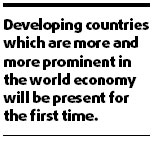G20 Summit and the road ahead
The current financial crisis has similar or bigger proportions than the one in the 1930s. The fact that it is not being reflected in a severe international recession is due to the massive programs to inject liquidity as well as the rescue of the banks in the United States, Europe, Asia and Oceania.
These millionaire packages have succeeded in avoiding the worst impacts of a global financial crisis, allowing us to leave behind the panic existing a few weeks ago, when there was indeed a risk of cash outflows and the breaking of the payment chains.
This is good news. However, they have not succeeded yet in avoiding the threat of an international recession, whose magnitude is still uncertain, though it is already clear that the United States, the European Union and Japan are going through an economic recession that will continue during most of 2009.
It is in this context that the European authorities, beginning with Gordon Brown, have emphasized the need for an International Summit to obtain global and coordinated answers to the crisis, including the reform of the international financial system. The United Nations has offered its central headquarters in New York for this meeting.
Eventually, the US President George W. Bush called for a G20 meeting on Saturday in Washington, whose agenda will include the causes and the management of the crisis, as well as the reforms concerning regulations and institutions that can prevent a repetition of similar crises.
With the same delay with which the United States joined the European formula for the rescue of the banks that included nationalization measures, they join now the European proposal to summon an international summit, in which developing countries which are more and more prominent in the world economy, such as China, India, Brazil and Mexico among others, will be present for the first time.
No doubt this is a notable move forward and because of this it would be useful that the developing countries arrive at that summit after reaching a series of agreements concerning important matters. I will proceed to refer to four of them.
First, privilege the process over the contents.
It is unrealistic to think that such a technically complex matter, a matter that also has so many geopolitical implications, can be solved in one meeting. Therefore, although the developing countries must work to find methods agreed upon by consensus that allow them to deal with the crisis and the international financial reform, the emphasis in this summit should be placed on reaching an agreement for the process that is starting now, as this process will last many years.

The important point is that this process must not leave out the main concerns of the developing countries about the asymmetries of the financial globalization regarding adjustment, financing and development. It is also important to decide on the places where the following meetings should be held. These meetings could be held in turns in different continents, or even better be held in the United Nations headquarters, thus reinforcing the sign of a multilateral effort.
Second, the link between crisis and reform.
There may exist an understandable interest coming from the United States to concentrate the efforts on preventing the current financial crisis from getting worse. These efforts should be supported but without overlooking the urge to reform the international financial system regarding its institutionalism (International Monetary Fund, World Bank, right to vote in these organizations), its functions and the role of the developing countries within it.
Otherwise, these unprecedented efforts regarding the confluence of political wills about the exhaustion of the current international financial system would be wasted. Along with the overcoming of the current crisis, regulatory and institutional conditions must be generated to prevent the gestation of similar crises and to provide a stable and reasonable financing model for the developing countries.
Third, balance between the political and technical aspects.
The international financial reform is a highly technical complex matter that cannot be dealt with in sessions. It also involves higher political implications about the type of globalization that we wish to build.
This means, for instance, that the political criteria to manage the reform should not come up from a technical group belonging to the IMF, since this would confront an obvious conflict of interests, being judge and part of the process at the same time. Such criteria should come up in the sphere of the United Nations, without precluding reference to every technical authority, including the IMF, when necessary
Fourth, an international financial system for the 21st century.
Any stable and permanent solution for the current financial crisis and, even more rightly, any proposal concerning the international financial reform must take into account the new realities of the 21st century.
Among these realities, what is remarkable is the relatively higher weight of the emerging economies, being China and India in the first place.
Data about the competitiveness, international trade, possession of international reserves, sovereign funds, technology capacity and contribution to the growing of the world product indicate that the prominence of these countries is now considerably bigger than in 1945, when the Bretton Woods institutions were created. If we aim seriously to an international financial reform that confers a wider governability to globalization, particularly to its financial segment, then this summit and the following ones should thoroughly consider these new realities.
The author is a Chilean economist and director of the International Trade and Integration at Economic Commission for Latin America and the Caribbean
(China Daily 11/13/2008 page9)














